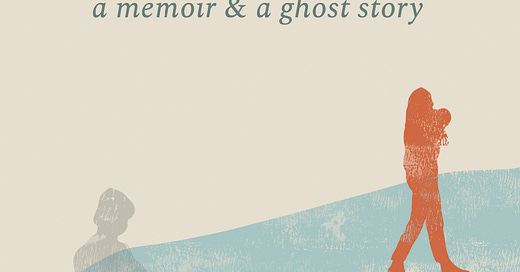REVIEW: Almost Mother: On Erica Stern's Frontier
Out now from Barrelhouse Books, Stern's debut is both a memoir and a ghost story.
In the opening pages of Erica Stern’s extraordinary debut Frontier: A Memoir and a Ghost Story (June 3, Barrelhouse Books), the author contemplates her imminent transformation: “Now I was woman, soon I would be mother, which I had been told was something other than mere woman.” She anticipates the “brilliant metaphors and images raining down” as she changes diapers and rocks her child, “the sacred and profane colliding.” Like most expectant mothers, Stern has absorbed the standard narrative of birth as a defining moment when one kind of person becomes another. What follows is anything but standard.
Stern’s hybrid memoir confronts the narrative fracture that occurs when birth veers from diaper commercial perfection into medical emergency. After a trouble-free pregnancy, Stern’s labor goes awry. Her son Jonah is born with hypoxic-ischemic encephalopathy (HIE), a brain injury caused by oxygen deprivation with widely varied outcomes, ranging from death to permanent brain damage to mild breathing problems, outcomes that are revealed as a child develops. Before Stern can hold her child, his grey-blue body is whisked away to be placed in a cooling cap for seventy-two hours, a medical intervention to prevent further brain damage. Stern, stranded and injured herself in the aftermath of birth, asks: Am I now a mother? When does motherhood begin if not at the moment of holding your newborn?
Frontier is in part a study of the failure of narrative and language to hold the birthing experience. Stern wanted to narrate the moment when she “transitioned from one kind of person into another,” but the moment of transition splintered into many—delivery, naming, first holding, first eye opening, MRI reading, discharge day—and she transitions not into a once and for all state of motherhood, but a motherhood that is continually reborn as the effects of her son’s injury are revealed. Additionally, language fails her: “This isn't the transition from woman to motherhood I expected. I’m becoming something else, but I don't know what that is. Without language to label it, I can’t fathom it.” She cannot narrate what she cannot name.
Yet despite the failures of narrative and language, Stern performs literary alchemy. She creates a hybrid form—part memoir, part ghost story, part research, part critique—that holds what conventional narrative cannot. The book itself becomes a frontier, an experimental space where multiple genres coexist to capture a maternal experience that exceeds any single mode of telling.
The brilliance of Frontier lies in how Stern builds a structure capable of holding fractured experience, when transition stalls. While predecessors like Rachel Cusk’s A Life's Work and Sheila Heti's Motherhood interrogate the existential dilemmas of motherhood, Stern confronts an elemental disruption—a birth that refuses to follow narrative convention, a maternal becoming that cannot be contained within Freytag's triangle of rising action, climax, and denouement:
I think about devising a Freytag's triangle for labor and delivery and what comes after. This new version would flatten and loop to represent a plot comprised not of rising and falling action, conflict followed by resolution, but of contractions bleeding together and water breaking that never ends and a delivery that seems like an ending but instead sends the protagonist back to start, to the doors of the hospital with the smiling doorman, trapped in iterative action.
Stern enacts this version of plot in Frontier, using echoes and questions and loops, to cycle the reader through beginnings that do not end and endings that begin. Similarly, Stern’s language viscerally explodes the sanitized version of birth that dominate our cultural conversations: “Being pregnant can feel like a transformation into a precious China doll protected in a case, and then labor hits and the doll gets taken out, thrown on the floor, smashed to pieces over and over again.” These explosions satisfy, provide a deep breath of yes, yes, it is like that, violent, wrenching, dramatic.
In the book’s most significant deviation from the expected, the fictional American Wild West sections, an unnamed woman gives birth to a stillborn baby, and dies herself, yet her ghost lingers, convinced her baby's spirit inhabits the body of her husband’s new wife’s child. This ghost story allows Stern to literalize the spectral quality of a motherhood that exists at the threshold between presence and absence. Elaine Tuttle Hansen’s Mother Without Child: Contemporary Fiction and the Crisis of Motherhood, a collection of literary criticism on motherhood in fiction, claims ‘mother’ is a relational concept and discusses the “borders of motherhood and the mothers who live there.” The ghost stalks the border of motherhood, only able to eye the baby. One day, the spirit of her dead son seems to sense her presence, and she knows that if she were embodied, they would have looked at each other “like real and mother son.” This is as close as the ghost mother will get to motherhood, an almost presence, a partial resolution to a story that begins with death.
The historical sections aren’t mere parallel construction; they create a haunting resonance with Stern's modern experience. Both mothers wait, both mothers lose the expected narrative of birth, both mothers find themselves caught in motherhood’s “interminable exile,” an absence from the selves they were before birth and the mother selves they are yet to become. While the ghost mother waits for the spirit of her baby caught in his stepbrother’s body, Stern waits for Jonah to “evolve into himself,” a wait that “has no end.” This doubling effect deepens our understanding of maternal experience across time, suggesting some aspects of birth have always exceeded our ability to narrate them cleanly.
Part of the failure of narrative to encapsulate birth stems from our inability to control birth and the resulting lack of cause and effect. Why did Stern’s baby suffer a brain injury? Medicine has no answer. Only the fact of the injury remains. Narrative likes cause and effect, consequences for past actions, yet Jonah’s brain injury has no precedent. Narrative also relies on characters acting on the world, but Stern, Jonah, and the ghost are acted upon and forced into the only available action—waiting. Before she gives birth, Stern acknowledges that birth is uncontrollable. Observing a doula assuring prospective parents they can avoid unwanted medical interventions, Stern reflects, “I swallowed the last grainy sip of my coffee and thought it strange how people wished to exercise control over the uncontrollable, over nature, instilling such meaning into a handful of hours—a fraction of their lives.” She understands the futility of such promises intellectually, but birth makes her inhabit that futility, live out what cannot be controlled or foretold.
One of the memoir’s most powerful currents is its indictment of how contemporary birth culture sets women up for devastation when things go wrong. “I feel I've been sold a lie,” Stern writes, “as though my ignorance was the fault of some shady conglomerate comprised of OBs and doulas and authors of pregnancy books and the CEO of buybuy BABY. Big Birthing instead of Big Pharma, out to trick the unsuspecting consumer.” Stern exposes so well the common prenatal sham that perfect preparation—prenatal yoga classes, birth plans, doulas and consumer purchase—guarantees perfect outcomes. When catastrophe strikes, the mother is left not only with trauma but with a profound narrative disruption.
Stern weaves religious and artistic motifs throughout Frontier particularly her childhood experience performing in “Godspell,” elements of Jewish tradition, and Nella Larsen’s Passing. These become vehicles for exploring waiting, expectations, and revelations. Each works to complicate narrative and its promises of resolution. In a particularly effective move, she invokes tohu vavohu, Hebrew for “void and without form,” to describe the liminal space she inhabits while waiting for Jonah's diagnosis, prognosis, first word. Because the extent of Jonah’s brain injury is unknown long past his NICU stay and can only be revealed through time, Stern and the readers are suspended in this liminal space waiting for a revelation only Jonah can provide.
There’s something profound in how the memoir positions maternal waiting not as passive but as active devotion. Stern pumps breastmilk for a baby she cannot yet hold. She sits vigil by his side. She watches for seizures. This waiting becomes its own form of mothering, a sacred attendance to possibility. Like Judaism itself, which waits for a messiah who hasn't yet arrived, Stern's motherhood dwells in anticipation, in faith without resolution.
Throughout the memoir, Stern questions whether traditional narrative resolution is possible given her experience. Yet in the book’s final movements, she achieves a genuine resolution that doesn’t betray the complexity of what came before. When Jonah finally speaks—his first word so significant for a child with unknown cognitive and language possibilities—Stern creates a moment of transcendent recognition that feels earned precisely because it doesn’t erase all that preceded it. The revelation doesn’t undo the injury or simplify the journey; instead, it provides confirmation: yes, he is here, and yes, I am his mother.
Frontier reminds us that birth stories are origin stories, not just of babies, but of mothers. Stern's account expands our understanding of how women become mothers, not always in the expected moment with the expected emotions, but sometimes through sustained attention to a child whose future remains uncertain, through repeated crossings of thresholds no one prepared them to face. In a literary landscape rich with motherhood narratives, Stern’s work stands apart—raw, intellectually rigorous, and formally inventive.






